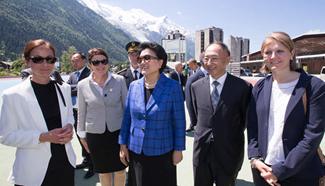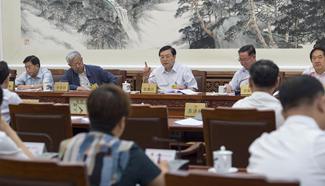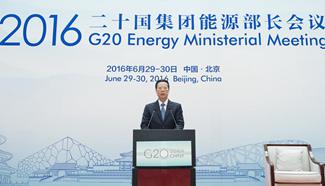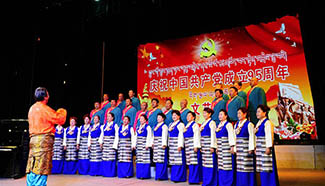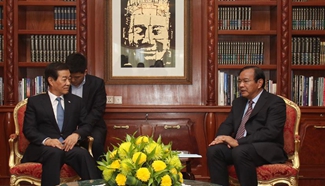BEIJING, June 29 (Xinhua) -- Following are remarks by Hong Lei, spokesperson for the Ministry of Foreign Affairs of the People's Republic of China, on the Arbitral Tribunal's claim that it would soon issue the so-called final award of the South China Sea arbitration unilaterally initiated by the Philippines.
The Arbitral Tribunal in the South China Sea arbitration established at the unilateral request of the Republic of the Philippines (hereinafter referred to as the "Arbitral Tribunal") claimed on 29 June 2016 that it would issue the so-called final award on 12 July 2016. I hereby once again emphasize that the Arbitral Tribunal has no jurisdiction over the case and the relevant subject-matter, and that it should not have heard the case or rendered the award.
1. On 22 January 2013, the Philippines unilaterally initiated the arbitration on the relevant disputes between China and the Philippines in the South China Sea. The Chinese government immediately declared that it would neither accept nor participate in the arbitration initiated by the Philippines, a position that has since been repeatedly reiterated.
On 7 December 2014, the Ministry of Foreign Affairs of China released upon authorization the Position Paper of the Government of the People's Republic of China on the Matter of Jurisdiction in the South China Sea Arbitration Initiated by the Republic of the Philippines, which comprehensively and systematically elaborates the position of the Chinese government on the matter of jurisdiction in the arbitration unilaterally initiated by the Philippines that the Arbitral Tribunal has no jurisdiction over the case, and that the Chinese government's non-acceptance of and non-participation in the arbitration are solidly founded in international law.
On 29 October 2015, the Arbitral Tribunal rendered an award on jurisdiction and admissibility. The Chinese government immediately stated that the relevant award is null and void and has no binding force. With regard to the hearing on the merits of the arbitration held from 24 to 30 November 2015, the Chinese government reiterated its position of non-acceptance and non-participation.
On 8 June 2016, the Ministry of Foreign Affairs of China released the Statement of the Ministry of Foreign Affairs of the People's Republic of China on Settling Disputes Between China and the Philippines in the South China Sea Through Bilateral Negotiation, reiterating its position of non-acceptance of and non-participation in the arbitration and settling the relevant disputes between China and the Philippines in the South China Sea through bilateral negotiation.
2. The Philippines' unilateral initiation of arbitration breaches international law.
First, China and the Philippines have agreed, through a series of bilateral instruments and the Declaration on the Conduct of Parties in the South China Sea, to settle their relevant disputes in the South China Sea through bilateral negotiation. The arbitration proceeding under the United Nations Convention on the Law of the Sea (UNCLOS) does not apply to the relevant disputes between China and the Philippines in the South China Sea.
Second, the essence of the subject-matter of the arbitration is the territorial sovereignty over some islands and reefs in the South China Sea, which is beyond the scope of UNCLOS and does not concern the interpretation or application of UNCLOS.
Third, the subject-matter of the arbitration constitutes an integral part of maritime delimitation between China and the Philippines, thus falling within the scope of the declaration made by China in 2006 pursuant to Article 298 of UNCLOS, which excludes disputes concerning maritime delimitation, among others, from arbitration and other compulsory dispute settlement procedures.
Fourth, the Philippines, in disregard of the fact that China and the Philippines have never engaged in any negotiation on any of the subject-matter of the arbitration, distorted concepts, invented disputes, and failed to fulfill its obligation under Article 283 of UNCLOS to exchange views on means of dispute settlement.
3. The Arbitral Tribunal, established on the basis of illegal conduct and claims of the Philippines, has no jurisdiction over the relevant matters. The Arbitral Tribunal, taking no regard of the fact that China and the Philippines have chosen to settle disputes through negotiation and consultation and the fact that the essence of the subject-matter of the arbitration is territorial sovereignty, circumvented the optional exceptions declaration China has made in accordance with UNCLOS, expanded and exceeded its jurisdiction at will, and pushed forward the hearing on the relevant subject-matter. Such acts have infringed on the right of a state party to UNCLOS to choose means of dispute settlement of its own will, and undermined the integrity of the UNCLOS dispute settlement regime.
4. With regard to territorial issues and maritime delimitation disputes, China does not accept any means of third party dispute settlement or any solution imposed on China. The Chinese government will continue to abide by international law and basic norms governing international relations as enshrined in the Charter of the United Nations, and will continue to work with states directly concerned to resolve the relevant disputes in the South China Sea through negotiation and consultation on the basis of respecting historical facts and in accordance with international law, so as to maintain peace and stability in the South China Sea.
Related:
Commentary: Ill-grounded S. China Sea arbitration to only worsen disputes among neighbors
BEIJING, June 29 (Xinhua) -- The South China Sea arbitration unilaterally initiated by the Philippines does not hold water from a legal standpoint and will not put an end to the South China Sea disputes, but only worsen them. Full story
Law-abusing tribunal to issue award on South China Sea arbitration
THE HAGUE, June 29 (Xinhua) -- An arbitral tribunal with widely contested jurisdiction will issue an award on July 12 on the South China Sea case unilaterally initiated by the Philippines, the Permanent Court of Arbitration (PCA) in The Hague said on Wednesday. Full story
Backgrounder: Timeline of Philippines' unilaterally initiated South China Sea arbitration case
BEIJING, June 29 (Xinhua) -- The Permanent Court of Arbitration (PCA) in The Hague has said on Wednesday that an arbitral tribunal with widely contested jurisdiction will issue an award on July 12 on the South China Sea case unilaterally initiated by the Philippines. Full story




